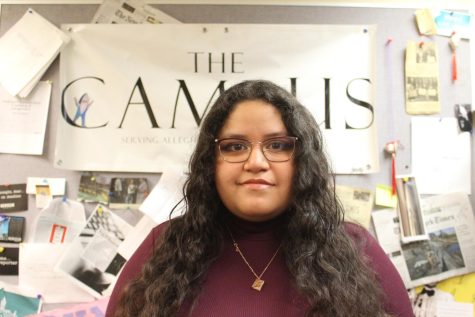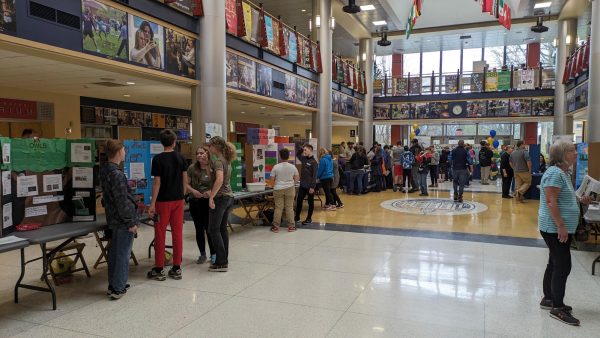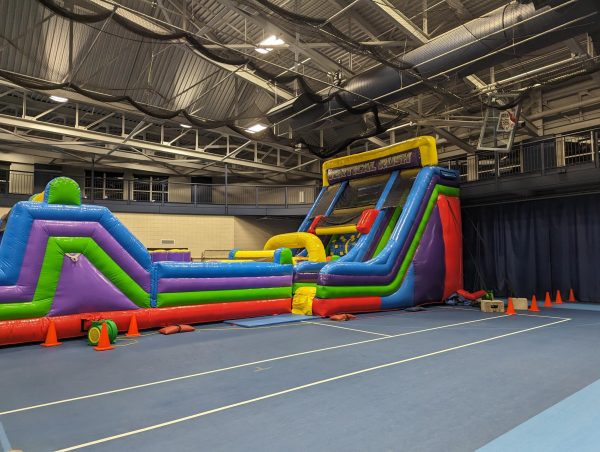New podcast spotlights student research
For many students, research is one of the most defining factors of an Allegheny College experience. Students across a diverse variety of disciplines who choose to participate in a research opportunity are required to create and manage their research projects according to their field of study.
To explore the breadth and depth of student research on campus, Associate Professor of Biology and Director of the Office of Undergraduate, Research, Scholarship and Creative Activities Matthew Venesky created a podcast, “Gator Talking About Inquiry, Learning and Scholarship.” The first episode of Gator Tails released on Friday, Sept. 30.
According to URSCA’s website, the podcast will feature students in various stages of their senior compositions and other research projects to discuss student creativity and research at the college.
Emma Yesko, ’23, was featured in the first episode of the podcast for her research of amphibian die-off at Allegheny’s Bousson Environmental Research Reserve. Her research was not her senior composition, but led her to further branch off to another aspect of her research for her senior project.
“Over the summer, (Venesky) and I were kind of looking around at Bousson to try to find out what we were going to do for our project,” Yesko said. “We ended up doing something completely different when we noticed the die-off of wood frog tadpoles.”
According to Yesko, speaking about her research in a 10-minute podcast helped her wrap up her research and bring it to a closing point for her summer research but also a jumping-off point for her senior project. Yesko described the benefits that could arise from sharing work at different stages of completion.
“If you talk to someone about your research it is like explaining it further than you really could by yourself because you’re trying to teach somebody about what you are doing,” Yesko said. “It can give you more insight because you can gain other people’s perspectives and the things that they find interesting which could be looked into and alter your thought process.”
According to Venesky, when coming up with the idea to create a podcast, he had many goals. One of his main goals was to give students the opportunity to showcase their research and to help students who are interested in research to find inspiration within the podcasts.
“A lot of student work gets buried in the senior comps or only a small group of folks get the opportunities to hear about what students are doing on campus,” Venesky said. “This podcast might help them find their own voice and get their footing for what they want to do.”
In creating the podcast, Venesky explained that despite having no experience with it he has found that he really enjoys being a host and has already made 8 episodes set to be released every 2-3 weeks. To be a host Venesky shared that he spends an hour before each interview preparing questions that tailor to each student who comes on based on their responses on a questionnaire.
“I love being a host more than I ever imagined because it is so exciting to have these conversations with students and watching them go from being nervous to being excited,” Venesky said. “I found that I only ask about half the questions that I prepare and the other half are just organic questions that kind of pop up as I have the conversation with the students.”
One of the added benefits that are expected to come from having a podcast dedicated to illuminating the research projects done by students is the connection that can be built between current students and alumni.
Senior Director of Annual Giving and Alumni Engagement Sara Pineo outlined some of the ways that alumni will be able to connect with students. Some of the ways alumni continue to stay connected with the college is through an email newsletter, social media and a magazine that comes out every six months. Pineo said she plans on introducing the podcast in the October newsletter and advertise on social media.
“I think it is really important for our alumni to see that Allegheny College is still a place where innovative research happens,” Pineo said. “So many of our alumni when you ask them about their experiences speak very fondly about their comp and talk about how meaningful that was in terms of securing maybe their first position or helping them identify their pathway.”
Looking forward, Venesky hopes that the podcast will become a project that is built upon on a weekly basis to capture all sides of the process of research projects. Through the process of making the podcast episodes, he wants students to have the opportunity to learn about themselves as they go through questions they never considered asking themselves before.
“Anytime we have conversations with people we learn more about ourselves,” Venesky said. “They might discover something about themselves, their career path or a connection that they are making between their comp and something else they never thought of before.”
According to Venesky, the next episode will come out on Oct. 14 and will feature Chemistry student Bill Nese’s, ’23, project on silver nanoparticle reactions with imizadole.

Evelyn Zavala is a senior from San Francisco. She is majoring in Business and minoring in Journalism in the Public Interest. This is her fourth year on...






